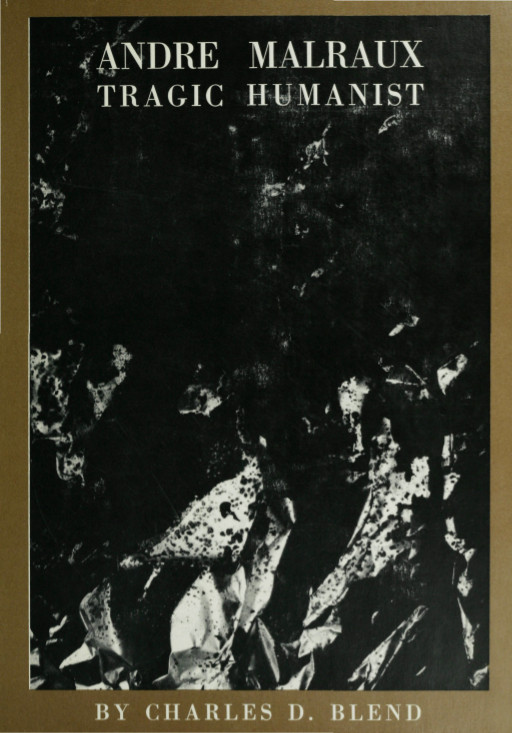Charles D. Blend: André Malraux: Tragic Humanist (1963)
Filed under book | Tags: · art, biography, communism, humanism, poetry, politics

“The dominant question arising from the unparalleled inhumanity of the mid-twentieth century, André Malraux has suggested “Is man dead?” Yet, for him, to pose the question is to answer it, for man proves his greatness, not by affirming it, but by questioning. It is by a mise en question of the universe that man rises above it.
This interpretation, long central to Malraux’s thinking, brings with it a number of difficulties. Previous concepts of man have produced an image, an ideal, toward which man could orient himself, and have presupposed a culture that had a role in the scheme of things. With a vision of man based on questioning rather than affirmation, it becomes impossible to preconceive an image of him or to visualize a form for human culture, and traditional humanism passes from the picture.
For Malraux, however, man has something that is greater than a preconceived image of himself: consciousness or awareness. To replace the images of man that have been destroyed or invalidated, Malraux calls for the will to grasp the greatest possible consciousness of what it is to be a man, coupled with the will to absolutely free discovery. Combining these values, Malraux suggests, produces a culture that is a human adventure, an advehture in freedom. Humanism is still possible, but it is a tragic humanism—humanism, because man knows his will and his starting point; tragic, because he can never know where he is going. Man can lead a dignified and fruitful existence given the will to struggle endlessly with the unknown.”
Publisher Ohio State University Press, 1963
255 pages
Jacques Rancière: Dissensus: On Politics and Aesthetics (2010)
Filed under book | Tags: · aesthetics, art, biopolitics, biopower, democracy, ontology, philosophy, politics, subjectivation

“Dissensus: On Politics and Aesthetics brings together some of Jacques Rancière’s most recent writings on art and politics to show the critical potential of two of his most important concepts: the aesthetics of politics and the politics of aesthetics.
In this fascinating collection, Rancière engages in a radical critique of some of his major contemporaries on questions of art and politics: Gilles Deleuze, Antonio Negri, Giorgio Agamben, Alain Badiou and Jacques Derrida. The essays show how Rancière’s ideas can be used to analyse contemporary trends in both art and politics, including the events surrounding 9/11, war in the contemporary consensual age, and the ethical turn of aesthetics and politics. Rancière elaborates new directions for the concepts of politics and communism, as well as the notion of what a ‘politics of art’ might be.
This important collection includes several essays that have never previously been published in English, as well as a brand new afterword. Together these essays serve as a superb introduction to the work of one of the world’s most influential contemporary thinkers.”
Edited and Translated by Steven Corcoran
Publisher Continuum, London/New York, Jan 2010
ISBN 1847064450, 9781847064455
240 pages
Reviews: Todd May (NDPR), David W. Hill (Marx & Philosophy).
PDF (updated on 2024-2-20)
Comment (0)Hito Steyerl: The Wretched of the Screen (2012–) [EN, ES]
Filed under book | Tags: · art, art theory, capitalism, contemporary art, democracy, image, politics

“In Hito Steyerl’s writing we begin to see how, even if the hopes and desires for coherent collective political projects have been displaced onto images and screens, it is precisely here that we must look frankly at the technology that seals them in. The Wretched of the Screen collects a number of Steyerl’s landmark essays from recent years in which she has steadily developed her very own politics of the image.
Twisting the politics of representation around the representation of politics, these essays uncover a rich trove of information in the formal shifts and aberrant distortions of accelerated capitalism, of the art system as a vast mine of labor extraction and passionate commitment, of occupation and internship, of structural and literal violence, enchantment and fun, of hysterical, uncontrollable flight through the wreckage of postcolonial and modernist discourses and their unanticipated openings.”
With Introduction by Franco “Bifo” Berardi
Publisher Sternberg Press, Berlin, September 2012
e-flux journal series
ISBN 9781934105825, 1934105821
200 pages
Reviews: Tony Wood (New Left Review, 2013), Maria Walsh (Art Monthly, 2013), McKenzie Wark (Public Seminar, 2015), Fracesca Da Rimini (ArtLink, 2015).
Exh. reviews: Holland Cotter (NY Times, 2012), Zoe Larkins (Art in America, 2012).
Editors
Publisher (EN)
Publisher (ES)
WorldCat (EN)
The Wretched of the Screen (English, 2012)
Los condenados de la pantalla (Spanish, trans. Marcelo Expósito, 2014, added on 2015-12-14)

